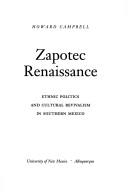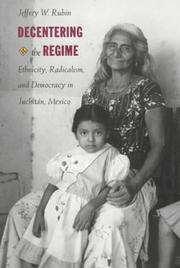| Listing 1 - 2 of 2 |
Sort by
|

ISBN: 0826315372 Year: 1994 Publisher: Albuquerque University of New Mexico press
Abstract | Keywords | Export | Availability | Bookmark
 Loading...
Loading...Choose an application
- Reference Manager
- EndNote
- RefWorks (Direct export to RefWorks)
"In this outstanding ethnography, Campbell explores how the construction of identity and the politics of ethnicity provide the Zapotec a sense of local power and independence. Focuses on the important role of indigenous intellectuals and the movement for local rule that has long consumed the community and its population"--Handbook of Latin American Studies, v. 57.

ISBN: 0822320509 0822320630 0822378612 Year: 1997 Publisher: Durham, NC : Duke University Press,
Abstract | Keywords | Export | Availability | Bookmark
 Loading...
Loading...Choose an application
- Reference Manager
- EndNote
- RefWorks (Direct export to RefWorks)
Since 1989 an indigenous political movement—the Coalition of Workers, Peasants, and Students of the Isthmus (COCEI)—has governed the southern Mexican city of Juchitán. In Decentering the Regime, Jeffrey W. Rubin examines this Zapotec Indian movement and shows how COCEI forged an unprecedented political and cultural path—overcoming oppression in the 1970s to achieve democracy in the 1990s. Rubin traces the history and rise to power of this grassroots movement, and describes a Juchitán that exists in substantial autonomy from the central Mexican government and Mexican nationalism—thereby debunking the notion that a state- and regime-centered approach to power can explain the politics of domination and resistance in Mexico.Employing an interdisciplinary approach, Rubin shows that the Juchitecos’ ability to organize and sustain a radical political movement grew out of a century-long history of negotiation of political rule. He argues that factors outside the realm of formal politics—such as ethnicity, language, gender, and religion—play an important part in the dynamics of regional political struggles and relationships of power. While offering a detailed view of the Zapotec community and its interactions, Rubin reconceptualizes democracy by considering the question of how meaningful autonomy, self-government, cultural expression, and material well-being can be forged out of violence and repression.
Central-local government relations --- Zapotec Indians --- Politics and government. --- Coalición Obrera Campesina Estudiantil del Istmo (Mexico). --- Juchitán de Zaragoza (Mexico) --- Be'ena'a Indians --- Ben 'Zaa Indians --- Binii Gula'sa' Indians --- Didxažon̳ Indians --- Tsapotecatl Indians --- Za Indians --- Zapoteca Indians --- Zapoteco Indians --- Indians of Mexico --- Chatino Indians --- Center-periphery government relations --- Local-central government relations --- Local government-central government relations --- Political science --- Decentralization in government --- Federal government --- Coalición Obrera Campesina Estudiantil del Istmo (Mexico) --- COCEI --- Worker-Peasant-Student Coalition of the Isthmus of Tehuantepec --- Juchitán de Zaragoza (Mexico) --- Juchitán (Mexico)
| Listing 1 - 2 of 2 |
Sort by
|

 Search
Search Feedback
Feedback About
About Help
Help News
News